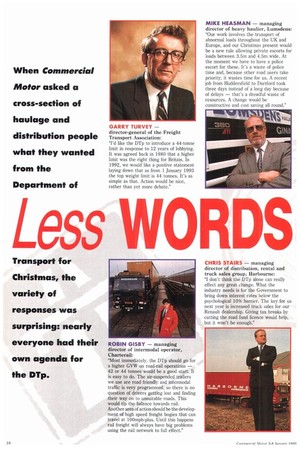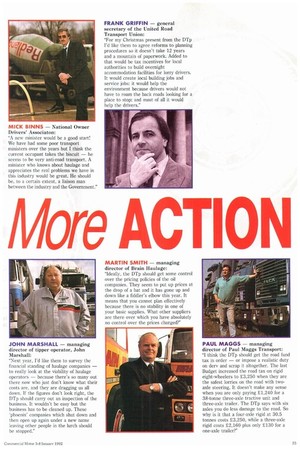Less WORDS More ACTION
Page 26

Page 27

If you've noticed an error in this article please click here to report it so we can fix it.
GARRY TURVEY — director-general of the Freight Transport Association: "I'd like the DTp to introduce a 44-tonne limit in response to 12 years of lobbying. It was agreed back in 1980 that a higher limit was the right thing for Britain. In 1992, we would like a positive statement laying down that as from 1 January 1993 the top weight limit is 44 tonnes. It's as simple as that. Action would be nice, rather than yet more debate."
ROBIN GISBY — managing director of intermodal operator, Charterail: Most immediately, the DTp should go for a higher GVW on road-rail operations — 42 or 44 tonnes would be a good start. It is easy to do. The air-suspended trailers we use are road friendly and intermodal traffic is very programmed, so there is no question of drivers getting lost and finding their way on to unsuitable roads. This would tip the balance towards rail. Another area of action should be the development of high speed freight bogies that can travel at 100mph-plus. Until this happens rail freight will always have big problems using the rail network to full effect." MIKE HEASMAN — managing director of heavy haulier, Lumsdens: Our work involves the transport of abnormal loads throughout the UK and Europe, and our Christmas present would be a new rule allowing private escorts for loads between 3.5m and 4.5m wide. At the moment we have to have a police escort for these. It's a waste of police time and, because other road users take priority, it wastes time for us. A recent job from Huddersfield to Dartford took three days instead of a long day because of delays — that's a dreadful waste of resources. A change would be constructive and cost saving all round."
CHRIS STAIRS — managing director of distribution, rental and truck sales group, Harbourne: "I don't think the DTp alone can really effect any great change. What the industry needs is for the Government to bring down interest rates below the psychological 10% barrier. The key for us next year is increased truck sales for our Renault dealership. Giving tax breaks by cutting the road fund licence would help, but it won't be enough." MICK BINNS — National Owner Drivers' Associaton:
"A new minister would be a good start! We have had some poor transport ministers over the years but I think the current occupant takes the biscuit — he seems to be very anti-road transport. A minister who knows about haulage and appreciates the real problems we have in this industry would be great. He should be, to a certain extent, a liaison man between the industry and the Government."
JOHN MARSHALL — managing director of tipper operator, John Marshall: "Next year, I'd like them to survey the financial standing of haulage companies — to really look at the viability of haulage operators — because there's so many out there now who just don't know what their costs are, and they are dragging us all down. If the figures don't look right, the DTp should carry out an inspection of the business. It wouldn't be easy but the business has to be cleaned up. These 'phoenix' companies which shut down and then open up again under a new name leaving other people in the lurch should be stopped."
FRANK GRIFFIN — general secretary of the United Road Transport Union:
"For my Christmas present from the DTp I'd like them to agree reforms to planning procedures so it doesn't take 12 years and a mountain of paperwork. Added to that would be tax incentives for local authorities to build overnight accommodation facilities for lorry drivers. It would create local building jobs and service jobs: it would help the environment because drivers would not have to roam the back roads looking for a place to stop: and most of all it would help the drivers."
MARTIN SMITH — managing director of Brain Haulage: "Ideally, the DTp should get some control over the pricing policies of the oil companies. They seem to put up prices at the drop of a hat and it has gone up and down like a fiddler's elbow this year. It means that you cannot plan effectively because there is no stability in one of your basic supplies. What other suppliers are there over which you have absolutely no control over the prices charged?"
PAUL MAGGS — managing director of Paul Maggs Transport: "I think the DTp should get the road fund tax in order — or impose a realistic duty on dery and scrap it altogether. The last Budget increased the road tax on rigid eight-wheelers to £3,250 when they are the safest lorries on the road with twoaxle steering. It doesn't make any sense when you are only paying £1,240 for a 38-tonne three-axle tractive unit and three-axle trailer. The DTp says with six axles you do less damage to the road, So why is it that a four-axle rigid at 30.5 tonnes costs £3,250, while a three-axle rigid costs £2,160 plus only £130 for a one-axle trailer?"
























































